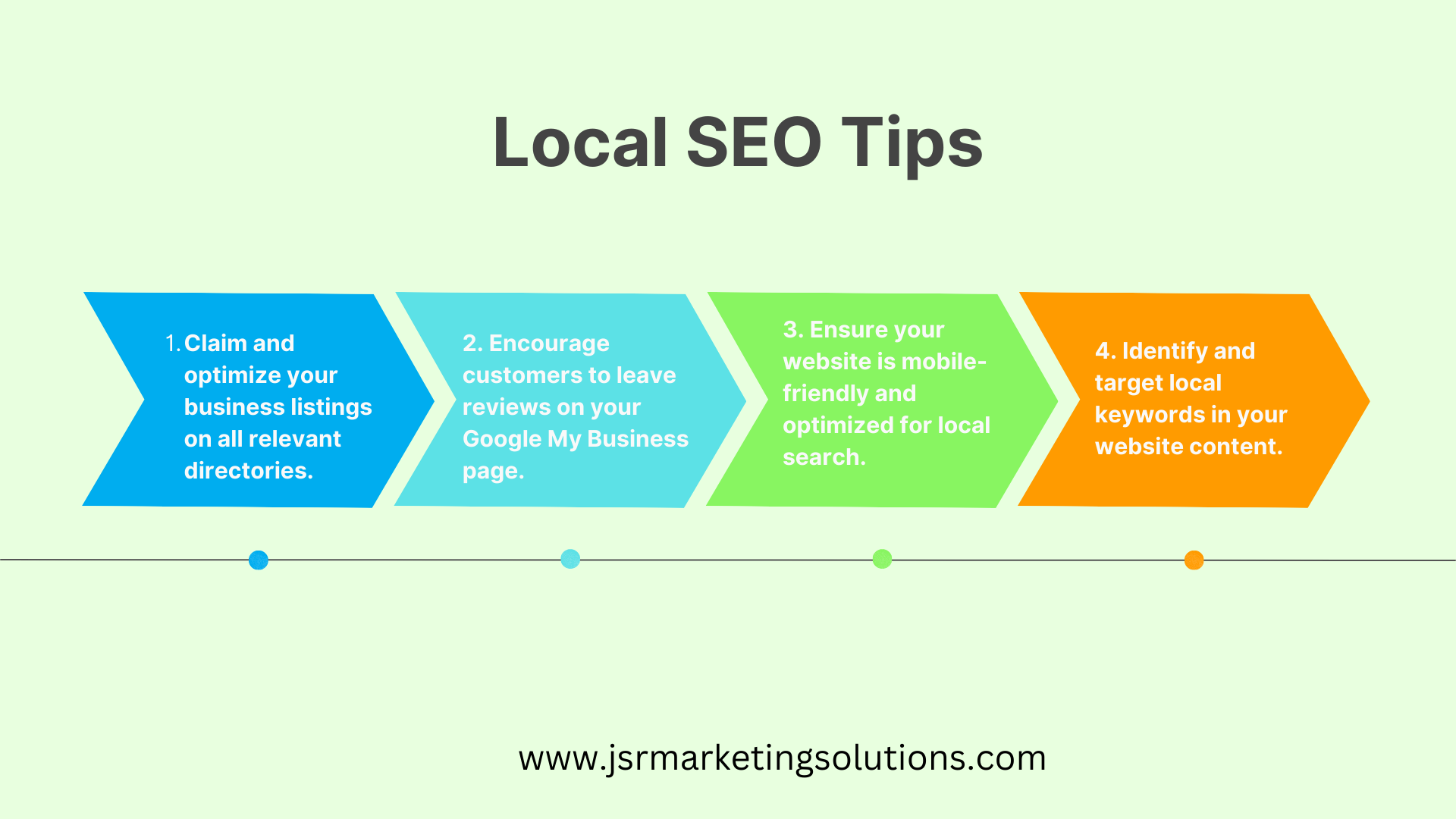9 Key Tips to Boost Local SEO Small Businesses
Small businesses need to have a strong online presence to compete in today’s digital landscape, and Local SEO is a crucial part of that. Local SEO Tips focuses on optimizing a website’s visibility in local search results, making it easier for potential customers to find your business. In this article, we’ll share nine key tips to help small businesses boost their Local SEO efforts and attract more customers. From optimizing Google My Business to building high-quality local citations, these tips will help you improve your local search rankings and grow your business.
1. Claim All Business Directories
Claiming your business listings on various online directories is an important first step in boosting your local SEO. Start with popular directories such as Google My Business, Yelp, Bing Places, and Facebook. Ensure that your business information, including name, address, phone number, and website URL, is consistent across all directories. This consistency will help search engines recognize and trust your business information, which can improve your search rankings. Additionally, claiming your listings allows you to manage your online reputation and respond to customer reviews.
2. Encourage Customer Reviews
Customer reviews are a critical component of local SEO as they provide social proof and influence potential customers’ purchasing decisions. Encourage your customers to leave reviews on your Google My Business page, Yelp, and other relevant directories. You can do this by adding a review request in your follow-up emails, including a review link on your website or social media profiles, or even by asking customers in-person. Be sure to respond to all reviews, both positive and negative, in a timely and professional manner. This shows that you value customer feedback and can also help improve your local search rankings.
3. Go Mobile
With more and more people using their mobile devices to search for local businesses, it’s crucial to ensure that your website is mobile-friendly. A mobile-friendly website not only provides a better user experience but can also improve your search rankings. Google prioritizes mobile-friendly websites in search results, so it’s essential to ensure your website is optimized for mobile devices. Some ways to optimize your website for mobile include using a responsive design, minimizing page load times, and ensuring that all website features are accessible on mobile devices.
4. Identify Local Keywords
Identifying local keywords is essential for optimizing your website and improving your local search rankings. Local keywords are search terms that include your business’s location, such as “best pizza restaurant in Brooklyn” or “plumber near me.” Conduct keyword research to identify the most relevant local keywords for your business and incorporate them naturally into your website content, including your page titles, headings, and meta descriptions. Additionally, consider creating location-specific landing pages that target specific local keywords to improve your local SEO efforts.
5. Create Selective Local Content
Creating selective local content is an effective way to improve your local SEO and attract more customers. This can include creating blog posts, videos, or social media content that highlights local events, news, or attractions related to your business. By creating content that is relevant to your local community, you can build your brand’s authority and credibility in the local market, which can improve your search rankings. Additionally, selective local content can help you target local keywords and attract more local traffic to your website.
6. Optimize Web Page SEO
Optimizing your website’s on-page SEO is crucial for improving your local search rankings. Start by optimizing your page titles, headings, and meta descriptions to include your relevant local keywords. Use descriptive and engaging content that accurately represents your business and provides value to potential customers. Additionally, ensure that your website’s URL structure is optimized for local search by including your business name and location in the URL if possible. Finally, make sure that your website has a clear site structure and is easy to navigate, both for users and search engines.
7. Ensure Consistent Citations
Consistent citations are essential for improving your local SEO. Citations are mentions of your business’s name, address, and phone number (NAP) on other websites, such as local directories, review sites, or social media platforms. Search engines use citations to verify the accuracy of your business information and improve your search rankings. Ensure that your business’s NAP is consistent across all citations, including variations in spelling, punctuation, or abbreviations. Use a citation management tool to monitor and manage your citations and ensure they are accurate and up-to-date. This will help improve your local search rankings and ensure that potential customers can find your business information online.
8. Land Local Backlinks
Getting local backlinks is an effective way to improve your local SEO and increase your website’s authority in the local market. Backlinks are links from other websites that point to your website and are an important ranking factor for search engines. To get local backlinks, consider partnering with local businesses or organizations to exchange links or sponsor local events or charities. Additionally, create high-quality, shareable content that other local websites may want to link to, such as infographics or industry reports. Finally, make sure your website’s content is informative and valuable, as this can increase the likelihood of other websites linking to your content.
9. Include Structured Data
Structured data, also known as schema markup, is a type of code that provides additional information about your website’s content to search engines. This information can include your business’s name, address, phone number, business hours, customer reviews, and more. By including structured data on your website, you can improve the visibility and accuracy of your business information in search results, which can improve your local search rankings. Use a structured data markup tool, such as Google’s Structured Data Markup Helper, to create and implement structured data on your website. This will help search engines understand your business information and improve your local SEO efforts.
Drive Organic Traffic with Local SEO
Local SEO is a powerful tool for driving organic traffic to your small business’s website. Optimizing your website and online presence for local searchwebsite and online presence for local search, you can increase your visibility to potential customers in your local market and improve your search rankings.
To drive organic traffic with local SEO, claim all relevant business directories, encourage customer reviews, ensure your website is mobile-friendly, identify and target local keywords, create selective local content, optimize your web page SEO, ensure consistent citations, land local backlinks, and include structured data. By following these tips, you can improve your local SEO efforts and attract more local customers to your small business.
Conclusion
In conclusion, local SEO is essential for small businesses looking to improve their online visibility and attract more local customers. By implementing the 9 key tips discussed above, businesses can optimize their online presence for local search, improve their search rankings, and drive organic traffic to their website.
From claiming and optimizing business directories to creating selective local content and landing local backlinks, these tips play a critical role in improving local SEO for small businesses. It’s important to remember that local SEO is an ongoing process that requires consistent effort and attention. By focusing on these key areas and regularly monitoring and adjusting your local SEO strategy, you can successfully boost your online visibility and attract more local customers to your small business.
Frequently Asked Question
Business directories are websites that list information about businesses, including their name, address, phone number, and other details. Claiming and optimizing your business listings on these directories can improve your online presence, make it easier for potential customers to find your business, and improve your local search rankings.
Customer reviews can impact local SEO in several ways. Firstly, they can provide valuable social proof and help build trust with potential customers. Secondly, search engines use customer reviews to understand the quality and reputation of a business, which can influence search rankings. Encouraging positive customer reviews can, therefore, improve your local search rankings.
With more and more people using mobile devices to search for local businesses, having a mobile-friendly website is crucial. A mobile-friendly website provides a better user experience and can improve your search rankings. Google prioritizes mobile-friendly websites in search results, so it’s essential to ensure your website is optimized for mobile devices.
Local keywords are search terms that include your business’s location, such as “best pizza restaurant in Brooklyn” or “plumber near me.” Identifying and targeting local keywords in your website content can improve your local search rankings and attract more local traffic to your website.
Structured data, also known as schema markup, is a type of code that provides additional information about your website’s content to search engines. By including structured data on your website, you can improve the visibility and accuracy of your business information in search results, which can improve your local search rankings.
Citations are mentions of your business’s name, address, and phone number (NAP) on other websites, such as local directories, review sites, or social media platforms. Consistent citations across these platforms help search engines verify the accuracy of your business information and improve your local search rankings.
Creating selective local content, such as blog posts or social media content that highlights local events or news related to your business, can improve your local SEO efforts by building your brand’s authority and credibility in the local market. Additionally, selective local content can help you target local keywords and attract more local traffic to your website.
Backlinks are links from other websites that point to your website and are an important ranking factor for search engines. Getting local backlinks, such as links from other local businesses or organizations, can increase your website’s authority in the local market and improve your local search rankings.
Small businesses can implement local SEO by following the 9 key tips mentioned above, such as claiming all business directories, encouraging customer reviews, optimizing their website for mobile, identifying local keywords, creating selective local content, and including structured data. It’s also essential to ensure consistent citations, land local backlinks, and optimize web page SEO to improve local search rankings.
Choose Jsrmarketingsolutions as your Digital partner if you need a complete Digital Marketing package or a Free SEO Audit For your business Call +919529598894






